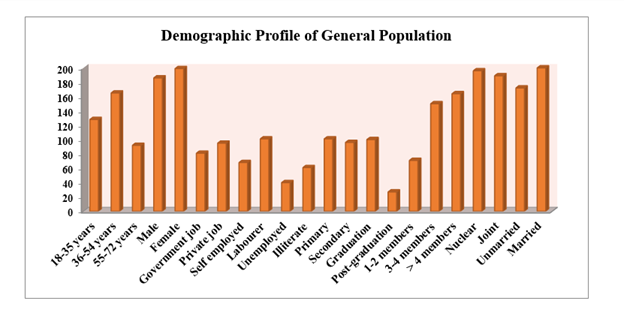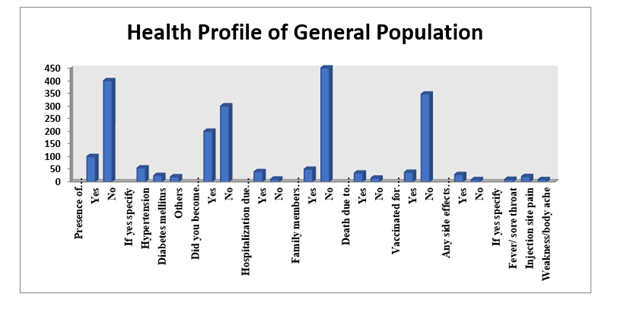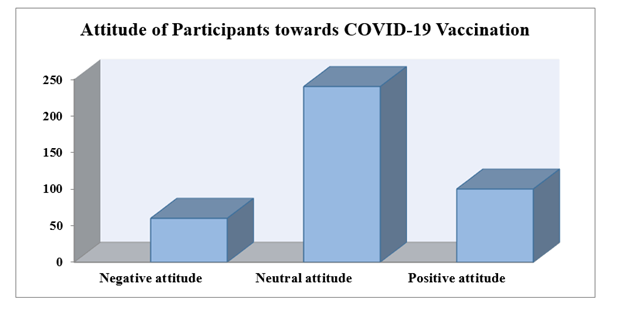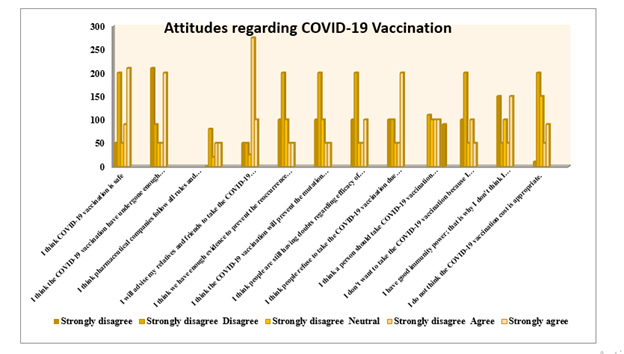ABSTRACT
Background: The public is hesitant about getting vaccinated for COVID-19, and a few people are still avoiding it. This aim of this study was to investigate the acceptance of COVID-19 vaccines and their determinants, as well as public perceptions of these vaccines in Sindh population. General participants from Sindh were surveyed on the acceptability of COVID-19 vaccines using a cross-sectional and self-administered questionnaire.
Materials and Methods: The aim of the cross-sectional study is to assess the possibility of evaluating the levels of healthiness literateness assistances about vaccination in the Sindh general population; through a questionnaire from October to December 2021 a total of 500 participants shall complete the survey. The attitudes towards COVID-19 vaccination were collected via questionnaire and analyzed using descriptive and inferential statistics.
Results: The greater number of participants had a neutral to positive attitude, and very few had a negative attitude towards COVID-19 vaccination. A significant positive association was found between attitude scores with COVID-19 vaccination and mortality among participant’s relatives and friends, while participant occupation and number of family members were associated with a more positive attitude.
Conclusion: These results suggest mainly neutral attitude towards COVID-19 vaccination. Therefore, it is important to design and implement innovative and efficient communication strategies to influence the neutral and offset the negative attitudes regarding vaccination drive to facilitate immunization outreach and coverage.
Keywords: Awareness; Attitudes; COVID-19 Vaccines
Introduction
The virus SARS-CoV-2 is genetically related to the previous generation of coronaviruses causing the SARS epidemic in 2003 [1]. The challenges created by COVID-19 have affected the wellbeing of all individuals in all communities irrespective of rich-poor, literate illiterate, rural-urban directly or indirectly [2-4]. Preventive measures such as physical distancing, avoiding social gatherings, enforcing masks as mandatory, hand sanitizing, and many others have become a daily routine from the beginning of national-wide lockdown. How- ever, the impact of the second wave has brought the importance of vaccination to the fore [5]. Since the emergence of a new epidemic, the whole human community anticipated effective pharmaceutical management either as medication or vaccine. Globally, more than 15 vaccines have been approved, and many have yet to prove their efficacy in trials. Despite the Government efforts, the hesitancy towards vaccines by the general public is concerning [6-7].
In general, vaccine preparation requires many years, while the fast-tracking of the vaccines against COVID-19 raised concerns among the public regarding vaccine safety and efficacy. The theory of planned behavior suggests that every per- son with particular behavior in taking the COVID-19 vaccine would be influenced by major factors such as an individual’s attitude towards a vaccine and perceived behavioral control regarding taking the vaccine [5]. Vaccines have been the most effective and reliable public health intervention for decades, saving millions of people from deadly infectious diseases [8]. Vaccination is one of the most effective ways to help reduce and eliminate viral infection and its spread [9]. Since the beginning of the Universal Immunization Program (UIP) [6]. Even the best vaccine against any infection may go unfruitful if it is less used or unused [9].
Therefore, the aim of this study was to investigate the acceptance of COVID-19 vaccines and their determinants, as well as public perceptions of these vaccines in Sindh population. General participants from Sindh were surveyed on the acceptability of COVID-19 vaccines using a cross-sectional and self-administered questionnaire.
Materials and Methods
The aim of the cross-sectional study is to assess the possibility of evaluating the levels of healthiness literateness assistances about vaccination in the Sindh general population; through a questionnaire from October to December 2021 a total of 500 participants shall complete the survey. The attitudes towards COVID-19 vaccination were collected via questionnaire and analyzed using descriptive and inferential statistics. The questionnaire were prepared, distributed, and collected by ‘based surveys and shared through other services. The sampling approach was convenient and nonprobability. Participants were given complete freedom to complete the survey and were encouraged to forward and share it with others. On the first page, participants were given information on the survey’s rationale and scope, which included gathering perceptions as well as methods and abilities for collecting, understanding, and using information about vaccination, including possible COVID-19 vaccines. They were assured that moving on to the second page of the survey and filling out the questionnaire meant they had given their consent.
Statistical Analysis
Statistical analysis was performed by using SPSS (version 20, SPSS, Chicago, IL, USA).
Results
The sample size consisted of 500. More than half of the participants were female. Comorbidities were reported in the general population (Figures 1 & 2). Many participants had a neutral to positive attitude, and very few had a negative attitude towards COVID-19 vaccination (Figure 3); COVID-19 vaccination and mortality among friends and relatives were significantly associated with their attitude towards COVID-19 vaccination. However, participant occupation and number of family members were significantly associated with their attitude towards COVID-19 vaccination. It was also noted that the presence of comorbidity and hospitalization history was not associated with participants’ attitudes from the general population (Figure 4). Almost one-third of participants strongly agreed regarding the safety and efficacy of COVID-19 vaccination. Furthermore, more than half of the participants strongly agreed that the pharmaceutical companies’ rules and regulations in manufacturing the COVID-19 vaccination as per the government norms. However, only about a third of participants agreed to advise their relatives and friends to take the COVID-19 vaccination. Furthermore, less than a third of reported neutral behavior towards the effectiveness of COVID-19 vaccination in preventing virus mutation, while a majority of participants demonstrated a neutral attitude towards the side effects of COVID-19 vaccination on their pre-existing disease conditions (Figure 4).
Discussion
In this cross-sectional study, most participants had a neutral attitude towards COVID-19 vaccination in the general population. The present study findings suggest that the general population shows some hesitancy to-wards the COVID-19 vaccination drive. A global survey study involving 13,426 participants from 19 countries targeting the acceptance of COVID 19 vaccinations in the general population reported China with the highest (88.6%) and lowest (54.8%) in Russia [10]. Moreover, middle-income countries, such as Brazil and South Africa, also show positive public acceptance [11]. How- ever, vaccine acceptance is more or less in harmony with the initial planning in developing countries [12] An Ethiopian study reported that one-fourth of participants (24.2%) had a positive attitude towards COVID-19 vaccination, and around (40.8%) respondents were aware of COVID-19 vaccination [13]. A similar study from Jordan revealed that less than half (37.4%) of respondents showed a positive attitude towards COVID-19 vaccination, and around (26.3%) of respondents are still unsure about vaccination.
The main concern of the general public refused to take vaccination fearing of side-effects of newly launched vaccines against COVID-19 but agreed to take after the licensing of pharmaceutical companies with the proper establishment of favorable effects of vaccines [14]. A study from Bangladesh revealed that more than half (74.5%) of the general population showed a positive attitude towards COVID-19 vaccination with a mean attitude score of 9.34 (2.39), and quite a few (8.5%) still showed some amount of hesitancy towards vaccination. It was more amongst the geriatric population, low literacy level, comorbidities, and less confidence in its healthcare system [15]. In the United Kingdom, it was found that only a few respondents exhibited high levels of uncertainty about vaccines and had a negative attitude towards COVID-19 vaccination, it was seen higher among individuals from ethnic groups, education level, monthly income, and poor knowledge regarding the high level of mutation of this deadly disease among the general population [16].
Another study from Malta reported that half of the participants had a positive attitude towards COVID-19 vaccination and were willing to take the vaccination. Vaccine hesitancy was a major setback in public opinion as one-third of participants were still in a dilemma towards vaccination, and some of them were not in favor of COVID-19 vaccination, and they refused to take it even after robust safety trials [5] The result was incongruent with the study done on the general population of Pakistan and found that most of the respondents showed a positive attitude towards vaccination and are willing for COVID-19 vaccination as soon as their chance will come and agreed to recommend their family and friends [17]. The present study results also suggested no relation of demographic variables with attitude scores. However, there is a significant association of the history of COVID-19 positive status in family and friends. Another study showed that participants more than 45 years of age and socio-economic status were significantly associated with attitude scores.
The willingness to pay for the vaccine was also significantly positively associated with socio-economic status, and the willingness to recommend the vaccine to family and friends was found to be significantly associated with place of residence [17]. A study done in Kuwait showed a significant association of gender with attitude scores as the male population was more willing to accept a COVID-19 vaccine than females and participants who previously received an influenza vaccine were more likely to accept a COVID-19 vaccine. In contrast, participants who were suffering from comorbidities were less willing to accept vaccination [18]. During the initial stages of the pandemic, the rural areas were the least affected compared to urban sectors. However, in the second wave, there was a significant rise in rural areas. The fundamental evidence for concern on vaccine drive is logistical constraints such as poor infrastructure, unskilled workers, and the lack of resources [19].
The survey was conducted when vaccination phase II started in the general population aged above 45 years; resulting uncertainty was more prevalent younger age groups. The vaccine motivation campaign was not active during the data collection period affecting the study findings. The current study’s recommendations suggest that a community-focused approach is required to deal with people’s mentality and mindset. Furthermore, the findings recommend interventional studies compared to rural and urban to attain more accuracy in the results.
Conclusion
The COVID-19 pandemic was, in some aspects, the worst pandemic in history, causing substantial mortality and morbidity rates, but the introduction of the COVID-19 vaccine offered a ray of hope for a better future. Negative attitudes towards vaccination and hesitancy or unwillingness regarding vaccination are the major concerns that need to be addressed. People in Pakistan currently have mainly neutral attitude regarding vaccination, requiring more authentic, reliable, and adequate information to assist them in decision-making. Positive attitudes and perceived usefulness of vaccination in the general population is crucial for a successful vaccination plan and prevention of new epidemics waves in the future.
Contributions
SS, SB, and AAK conceptualized, performed and wrote the first draft. SS supervised the study. All authors read and approved the manuscript.
Ethical Approval
Ethical approval was obtained from the institutional ethics committee with letter no. No. LUMHS/REC/-218 dated 25 November 2021.
References
- Zarocostas J (2020) How to fight an infodemic. Lancet 395: 676.
- Hua J, Shaw S (2020) Corona virus (COVID-19) “infodemic” and emer-ging issues through a data lens: the case of China. Int J Environ Res Public Health 17(7): 2309.
- Biasio LR, Carducci A, Fara GM, Giammanco G, Lopalco PL (2018) Health literacy, emotionality, scientific evidence: elements of an effective communication in public health. Hum Vaccin Immunother 14(6): 1515-1516.
- Sørensen K, Van Den Broucke S, Fullam J, Doyle G, Pelikan J, et al. (2012) Health literacy and public health: A systematic review and integration of definitions and models. BMC Public Health 12(1): 80.
- Paakkari L, Okan O (2020) COVID-19: health literacy is an underesti-mated problem. Lancet Public Health 5(5): e249-e250.
- Signorelli C, Scognamiglio T, Odone AO (2020) COVID-19 in Italy: impact of containment measures and prevalence estimates of infec-tion in the general population. Acta Biom 91(3–S): 175-179.
- Health Literacy about Vaccination of adults ITalian (HLVa-IT). Downloadable at health literacy tool shed.
- Ishikawa H, Takeuchi T, Yano E (2008) Measuring functional, commu-nicative, and critical health literacy among diabetic patients. Diabetes Care 31(5): 874-879.
- Biasio LR, Giambi C, Fadda G, Bonaccorsi G, Lorini C, et al. (2020) Validation of an Italian tool to assess VL in adulthood vaccina-tion: a pilot study. Ann Ig 32(3): 205-222.
- Nutbeam D (2000) Health literacy as a public health goal: a challenge for contemporary health education and communication strategies into the 21st Health Promot Int 15(3): 259-267.
- VS Arpitha, Patil PS, NV Pradeep (2020) Assessment of knowledge and practice towards COVID-19 amid inhabitants of Karnataka. Int J Med Sci Publ Health 9(5): 300-305.
- Geldsetzer P (2020) Knowledge and perceptions of COVID- 19 among the general public in the United States and the United Kingdom: A cross-sectional outline survey. Ann Intern Med M20-0912.
- Hamed A, Nedai A, Asma’a AM, Mohammad AL, Amin A, et al. (2020) COVID-19: Knowledge, attitude and practice among medical and non-medical university students in Jordan. J Pure Appl Microbiol 14: 17-24.
- Singh JP, seroda A, gupta SD (2020) Assessing the knowledge, attitude and practices of students regarding the COVID-19 pandemic. J Health Manage 22(2): 281-290.
- Abdelhafiz AS, Mohammad Z, Ibrahim ME, Ziady HH, Alorabi M, et al. (2020) Knowledge, perceptions and attitude of Egyptians towards the novel coronavirus disease (COVID-19). J Comm Health 45: 881-896.
- Li LQ, Huang T, Wang YQ (2020) Novel coronavirus patients’ clinical characteristics, discharge rate and fatality rate of meta-analysis. J Med Virol 92: 577-583.
- Liang W, Guan W, Chen R (2020) Cancer patients in SARS- COv-2 infection: A nationwide analysis in China. Lancet Oncol 21(3): 335-337.
- Giao H, han NTN, Khanh TV, Ngan VK, Tam VV, et al. (2020) Knowledge and attitude towards COVID-19 among healthcare workers at District 2 hospital, Ho Chi Minh City. As Pac J Trop Med 13(6): 260-265.
- Al-Hanawi MK, Angawi K, Aishareef N, Qatlan AMN, Helmy HZ, et al. (2020) Knowledge, attitude and practice toward COVID-19 among the public in the kingdom of Saudi Arabia: A cross- sectional study. Front Publ Health 8: 45-49.

 Research Article
Research Article



